English – squashed sentences
In half-term, I went to the cinema I saw Early Man it was great!
In this example, there are actually three ‘chunks’ (clauses) that all make sense and need to be split up (using a full stop or a dash or a semi-colon):
In half-term, I went to the cinema. I saw Early Man – it was great!
The sentences could also be joined with a conjunction:
In the half-term, I went to the cinema and I saw Early Man – it was great!
This week’s bible story
Moses: Exodus 20.1-17
Moses is one of the great biblical heroes and is revered by Christians, Jews, and Muslims. There are many stories about this great and inspirational leader, but one of the things that we most associate with Moses is the Ten Commandments. The ten commandments are ten instructions about the way people should live if they are to be happy and live together in peace.
Read the story of Moses and the ten commandments.
Moses tried to keep the people’s spirits high and led them on through the desert until they came to the Oasis of Sinai. Here, there was water and food and they could set up their tents for a while. It was on Mount Sinai that God gave Moses a list of rules about the best way to live.
Reflection:
The first three commandments are about loving God, but the others are about loving other people. The world would not be a good place if everyone just did whatever they felt like doing all the time. If there were no rules, people could do bad or unkind things and get away with it. Rules are important so that we learn about what is right and wrong, good and bad, helpful and unhelpful. Rules are there for a reason: to help us stay safe.
In the New Testament part of the Bible, Jesus spoke about a new commandment that has two parts. He stated that people should love God and love others. How could we do that today?
Prayer
Dear God,
Help us to see that rules are there to keep us safe and happy.
Help us to love other people and to act in a way that shows care for them.
Help us to follow the best ways.
Be near to us when we find it difficult.
Guide us to live together in peace and harmony.
Amen.
Week beginning 24 January 2022
Sorry you can’t be in school this week. Here are a range of resources linked to what is happening in class. Don’t forget to get in touch with your class teacher if you need support.
Maths
Follow this sequence of maths learning which is linked to decimals.
Lesson 1: video, worksheet, answers
Lesson 2: video, worksheet, answers
Lesson 3: video, worksheet, answers
Lesson 4: video, worksheet, answers
Lesson 5: video, worksheet, answers
Lesson 6: video, worksheet, answers
Lesson 7: video, worksheet, answers
Lesson 8: video, worksheet, answers
Lesson 9: video, worksheet, answers
Lesson 10: video, worksheet, answers
You don’t have to print the worksheet. Your child can write or draw their answers on paper. Your child’s learning will be most effective if you sit with them to pause the clip and check / praise / support your child as the clip moves on.
Practise times tables on Times Table Rockstars, too. Email the class teacher if you need your child’s login and password details.
(Suggested time: 30 minutes of Maths and 15 minutes of Rockstars daily)
Spelling
Look on the homework page to find this week’s spellings. They should choose some past spellings that they feel less confident with. Your child should complete one task each day.
- Day 1: Generate more words linked to the spelling pattern or ‘rule’. You could look out for the words in the book you’re reading at home, or any other text, like a website linked to our science topic of Living Things and their Habitat.
- Day 2: Practise the spellings using two of the ideas in our Super Spelling Strategies guide. (Set yourself and others at home a challenge of using some of the words when you’re speaking, too!)
- Day 3: Write separate sentences, each containing one of the spellings. (Don’t forget to show off really neat handwriting and make sure you sentence starts with a capital letter and ends with a full stop, exclamation mark (!) or question mark (?).
- Day 4: Repeat Task 2 or 3.
- Day 5: Get an adult at home to test you on your spellings. Practise any you spell incorrectly – you could write them out carefully until you’re sure.
(Suggested time: 15-20 minutes daily)
Reading fluency
This is the text we’re using in class this week to build up fluency skills. It’s a promotional text about Jorvik Viking Centre.
In school, we generally follow this sequence:
- Day 1: Read the text aloud with your child listening. Read it clearly and slowly, pointing to each word as you read. Have a chat about any unfamiliar words.
- Day 2: Read aloud each sentence (a full short sentence or part of a longer sentence), and have your child read it back to you. Do this ‘echo reading’ for the whole text.
- Day 3: Read the text and talk about the effect of the punctuation on how you read it – pauses for full stops and expression for exclamations (!) or questions (?). Your child reads the text aloud.
- Day 4: Read together with expression (just like you practised on Day 3).
- Day 5: Your child reads independently and fluently.
(Suggested time: 15 minutes daily)
Reading comprehension
We’ll be using this RIC text in class to practise comprehension skills. RIC stands for:
- Retrieve: finding information in a text
- Interpret: using clues in the text to unlock information
- Choice: thinking about the author’s choice of words, techniques or organisation that make the text interesting and enjoyable to read
This half term we’ll be reading some Norse myths for our topic on Vikings and the Islamic Golden Age. In science, we’ll be learning about evolution. Follow this series of lessons on Mary Anning and Hidden Depths. There’s a whole series of lessons, but start at Lesson 1 and work through, doing one (or maybe even two) each day. (If you’re self-isolating in your second week, stick with the series of lessons you’ve already started and aim to complete the full series.)
(Suggested time: 30 minutes daily)
Writing
Follow these lessons on The Jabberwocky by Lewis Carroll. There’s a whole series of lessons, but start at Lesson 1 and work through, doing one (or maybe even two) each day. (If you’re self-isolating in your second week, stick with the series of lessons you’ve already started and aim to complete the full series.)
(Suggested time: 30-40 minutes for each)
Topic
Our topic this half-term is history.
Follow these lessons on Vikings and Saxons from Oak Academy. Follow the lesson sequence. It has 5 lessons so you could do two a week.
(Suggested time: 30-40 minutes)
Science
Our focus this half-term is light.
These six lessons from Oak National Academy link closely to what we’ve been doing in class last half term. Start at Lesson 1 and work through, doing two or three in the week. If you’ve previously completed one of these lessons, have a go at the ones you haven’t completed yet.
If Science really motivates your child, you could also use look at these lessons all about practical Science.
(Suggested time: 30-45 minutes)
PE
Don’t forget to do some daily exercise!
Do two or three of these Five Minute Moves from Joe Wicks each day – spread them across the day as if they were playtimes, maybe!
Try working through this series of 25 lessons from the Association for Physical Education – do two or three in the week.
(Suggested time: 5 minutes daily, plus 30 minutes for the longer PE lessons)
Extra stuff…
As an extra (or as an alternative, if this helps to motivate your child)…
Geography isn’t a topic-driver this half-term, but you could brush up on your locational knowledge – something that was missed when schools closed earlier this year. You could explore some online maps and try to memorise some new countries, capitals, rivers and mountain ranges. These three lessons about Europe are worth checking out.
What about some Living and Learning? While you’re away from school, you could check out these lessons on money!
Week beginning 24 January 2022
Sorry you can’t be in school this week. Here are a range of resources linked to what is happening in class. Don’t forget to get in touch with your class teacher if you need support.
Maths
Follow this sequence of maths learning which is linked to multiplication and division.
Lesson 1: video, worksheet, answers
Lesson 2: video, worksheet, answers
Lesson 3: video, worksheet, answers
Lesson 4: video, worksheet, answers
Lesson 5: video, worksheet, answers
Lesson 6: video, worksheet, answers
Lesson 7: video, worksheet , answers
Lesson 8: video, worksheet , answers
Lesson 9: video, worksheet , answers
Lesson 10: video, worksheet , answers
You don’t have to print the worksheet. Your child can write or draw their answers on paper. Your child’s learning will be most effective if you sit with them to pause the clip and check / praise / support your child as the clip moves on.
Practise times tables on Times Table Rockstars, too. Email the class teacher if you need your child’s login and password details.
(Suggested time: 30 minutes of Maths and 15 minutes of Rockstars daily)
Spelling
Look on the homework page to find this week’s spellings. They should choose some past spellings that they feel less confident with. Your child should complete one task each day.
- Day 1: Generate more words linked to the spelling pattern or ‘rule’. You could look out for the words in the book you’re reading at home, or any other text, like a website linked to our science topic of Living Things and their Habitat.
- Day 2: Practise the spellings using two of the ideas in our Super Spelling Strategies guide. (Set yourself and others at home a challenge of using some of the words when you’re speaking, too!)
- Day 3: Write separate sentences, each containing one of the spellings. (Don’t forget to show off really neat handwriting and make sure you sentence starts with a capital letter and ends with a full stop, exclamation mark (!) or question mark (?).
- Day 4: Repeat Task 2 or 3.
- Day 5: Get an adult at home to test you on your spellings. Practise any you spell incorrectly – you could write them out carefully until you’re sure.
(Suggested time: 15-20 minutes daily)
Reading fluency
This is the text we’re using in class this week to build up fluency skills. It’s a promotional text about Jorvik Viking Centre.
In school, we generally follow this sequence:
- Day 1: Read the text aloud with your child listening. Read it clearly and slowly, pointing to each word as you read. Have a chat about any unfamiliar words.
- Day 2: Read aloud each sentence (a full short sentence or part of a longer sentence), and have your child read it back to you. Do this ‘echo reading’ for the whole text.
- Day 3: Read the text and talk about the effect of the punctuation on how you read it – pauses for full stops and expression for exclamations (!) or questions (?). Your child reads the text aloud.
- Day 4: Read together with expression (just like you practised on Day 3).
- Day 5: Your child reads independently and fluently.
(Suggested time: 15 minutes daily)
Reading comprehension
We’ll be using this RIC text in class to practise comprehension skills. RIC stands for:
- Retrieve: finding information in a text
- Interpret: using clues in the text to unlock information
- Choice: thinking about the author’s choice of words, techniques or organisation that make the text interesting and enjoyable to read
This half term we’ll be reading some Norse myths for our topic on Vikings and the Islamic Golden Age. In science, we’ll be learning about evolution. Follow this series of lessons on Mary Anning and Hidden Depths. There’s a whole series of lessons, but start at Lesson 1 and work through, doing one (or maybe even two) each day. (If you’re self-isolating in your second week, stick with the series of lessons you’ve already started and aim to complete the full series.)
(Suggested time: 30 minutes daily)
Writing
Follow these lessons on The Jabberwocky by Lewis Carroll. There’s a whole series of lessons, but start at Lesson 1 and work through, doing one (or maybe even two) each day. (If you’re self-isolating in your second week, stick with the series of lessons you’ve already started and aim to complete the full series.)
(Suggested time: 30-40 minutes for each)
Topic
Our topic this half-term is history.
Follow these lessons on Vikings and Saxons from Oak Academy. Follow the lesson sequence. It has 5 lessons so you could do two a week.
(Suggested time: 30-40 minutes)
Science
Our focus this half-term is light.
These six lessons from Oak National Academy link closely to what we’ve been doing in class last half term. Start at Lesson 1 and work through, doing two or three in the week. If you’ve previously completed one of these lessons, have a go at the ones you haven’t completed yet.
If Science really motivates your child, you could also use look at these lessons all about practical Science.
(Suggested time: 30-45 minutes)
PE
Don’t forget to do some daily exercise!
Do two or three of these Five Minute Moves from Joe Wicks each day – spread them across the day as if they were playtimes, maybe!
Try working through this series of 25 lessons from the Association for Physical Education – do two or three in the week.
(Suggested time: 5 minutes daily, plus 30 minutes for the longer PE lessons)
Extra stuff…
As an extra (or as an alternative, if this helps to motivate your child)…
Geography isn’t a topic-driver this half-term, but you could brush up on your locational knowledge – something that was missed when schools closed earlier this year. You could explore some online maps and try to memorise some new countries, capitals, rivers and mountain ranges. These three lessons about Europe are worth checking out.
What about some Living and Learning? While you’re away from school, you could check out these lessons on money!
Week beginning 24 January 2022
Hi everyone
We hope you’re feeling happy and healthy at home. We miss having you in school but we want you to know that you’re still very much part of our school community. Enjoy your home learning for this week.
Maths
Follow this sequence of maths learning which is linked to multiplication and division.
- Lesson 1: video, worksheet, answers
- Lesson 2: video, worksheet, answers
- Lesson 3: video,
- Lesson 4: video, worksheet, answers
- Lesson 5: video,
- Lesson 6: video, worksheet, answers
- Lesson 7: video, worksheet, answers
- Lesson 8: video,
- Lesson 9: video,
- Lesson 10: video, worksheet, answers
You don’t have to print the worksheet. Your child can write or draw their answers on paper. Your child’s learning will be most effective if you sit with them to pause the clip and check / praise / support your child as the clip moves on.
Practise times tables on Times Table Rockstars, too. If your child is in Y3, we’re concentrating on the 8 times table. If your child is in Y4, we’re concentrating on all times tables up to and including 12 x 12. Email the class teacher if you need your child’s login and password details.
(Suggested time: 30 minutes of Maths and 15 minutes of Rockstars daily)
Spelling
Look on the homework page to find this week’s spellings. They should choose some past spellings that they feel less confident with. Your child should complete one task each day.
- Day 1: Generate more words linked to the spelling pattern or ‘rule’. You could look out for the words in the book you’re reading at home, or any other text, like a website linked to our science topic of Living Things and their Habitat.
- Day 2: Practise the spellings using two of the ideas in our Super Spelling Strategies guide. (Set yourself and others at home a challenge of using some of the words when you’re speaking, too!)
- Day 3: Write separate sentences, each containing one of the spellings. (Don’t forget to show off really neat handwriting and make sure you sentence starts with a capital letter and ends with a full stop, exclamation mark (!) or question mark (?).
- Day 4: Repeat Task 2 or 3.
- Day 5: Get an adult at home to test you on your spellings. Practise any you spell incorrectly – you could write them out carefully until you’re sure.
(Suggested time: 15-20 minutes daily)
Reading fluency
This is the text we’re using in class this week to build up fluency skills.
In school, we generally follow this sequence:
- Day 1: Read the text aloud with your child listening. Read it clearly and slowly, pointing to each word as you read. Have a chat about any unfamiliar words.
- Day 2: Read aloud each sentence (a full short sentence or part of a longer sentence), and have your child read it back to you. Do this ‘echo reading’ for the whole text.
- Day 3: Read the text and talk about the effect of the punctuation on how you read it – pauses for full stops and expression for exclamations (!) or questions (?). Your child reads the text aloud.
- Day 4: Read together with expression (just like you practised on Day 3).
- Day 5: Your child reads independently and fluently.
(Suggested time: 15 minutes daily)
Reading comprehension
We’ll be using this RIC text in class to practise comprehension skills. RIC stands for:
- Retrieve: finding information in a text
- Interpret: using clues in the text to unlock information
- Choice: thinking about the author’s choice of words, techniques or organisation that make the text interesting and enjoyable to read
Follow these lessons from Oak National Academy. There’s a whole series of lessons, but start at Lesson 1 and work through, doing one (or maybe even two) each day. (If you’re self-isolating in your second week, stick with the series of lessons you’ve already started and aim to complete the full series.)
(Suggested time: 30 minutes daily)
Writing
Follow these lessons from Oak National Academy. There’s a whole series of lessons, but start at Lesson 1 and work through, doing one (or maybe even two) each day. (If you’re self-isolating in your second week, stick with the series of lessons you’ve already started and aim to complete the full series.)
(Suggested time: 30-40 minutes for each)
Topic
Our topic this half-term is about history.
Follow these lessons from Oak National Academy. There’s a whole series of lessons, but start at Lesson 1 and work through, doing one (or maybe even two) each day. (If you’re self-isolating in your second week, stick with the series of lessons you’ve already started and aim to complete the full series.)
(Suggested time: 30-40 minutes)
Science
Our focus this half-term is about light.
These six lessons from Oak National Academy link closely to what we’ve been doing in class. Start at Lesson 1 and work through, doing two or three in the week. If you’ve previously completed on of these lessons, have a go at the ones you haven’t completed yet.
If Science really motivates your child, you could also use look at these lessons all about practical Science.
(Suggested time: 30-45 minutes)
PE
Don’t forget to do some daily exercise!
Do two or three of these Five Minute Moves from Joe Wicks each day – spread them across the day as if they were playtimes, maybe!
Try working through this series of 25 lessons from the Association for Physical Education – do two or three in the week.
(Suggested time: 5 minutes daily, plus 30 minutes for the longer PE lessons)
Extra stuff…
As an extra (or as an alternative, if this helps to motivate your child)…
Fancy learning about a new religion? You don’t have to be religious to learn about, and appreciate, religions from all around the world. Check out this set of lessons from Oak National Academy – you could choose to focus on one religion or dip into each set for an overview.
What about some Living and Learning? While you’re away from school, you could check out these lessons on keeping safe!
Week beginning 24 January 2022
Hi everyone
We hope you’re feeling happy and healthy at home. We miss having you in school but we want you to know that you’re still very much part of our school community. Enjoy your home learning for this week.
Maths
Follow this sequence of maths learning which is linked to multiplication and division.
- Lesson 1: video, worksheet, answers
- Lesson 2: video, worksheet, answers
- Lesson 3: video,
- Lesson 4: video, worksheet, answers
- Lesson 5: video,
- Lesson 6: video, worksheet, answers
- Lesson 7: video, worksheet, answers
- Lesson 8: video,
- Lesson 9: video,
- Lesson 10: video, worksheet, answers
You don’t have to print the worksheet. Your child can write or draw their answers on paper. Your child’s learning will be most effective if you sit with them to pause the clip and check / praise / support your child as the clip moves on.
Practise times tables on Times Table Rockstars, too. If your child is in Y3, we’re concentrating on the 8 times table. If your child is in Y4, we’re concentrating on all times tables up to and including 12 x 12. Email the class teacher if you need your child’s login and password details.
(Suggested time: 30 minutes of Maths and 15 minutes of Rockstars daily)
Spelling
Look on the homework page to find this week’s spellings. They should choose some past spellings that they feel less confident with. Your child should complete one task each day.
- Day 1: Generate more words linked to the spelling pattern or ‘rule’. You could look out for the words in the book you’re reading at home, or any other text, like a website linked to our science topic of Living Things and their Habitat.
- Day 2: Practise the spellings using two of the ideas in our Super Spelling Strategies guide. (Set yourself and others at home a challenge of using some of the words when you’re speaking, too!)
- Day 3: Write separate sentences, each containing one of the spellings. (Don’t forget to show off really neat handwriting and make sure you sentence starts with a capital letter and ends with a full stop, exclamation mark (!) or question mark (?).
- Day 4: Repeat Task 2 or 3.
- Day 5: Get an adult at home to test you on your spellings. Practise any you spell incorrectly – you could write them out carefully until you’re sure.
(Suggested time: 15-20 minutes daily)
Reading fluency
This is the text we’re using in class this week to build up fluency skills.
In school, we generally follow this sequence:
- Day 1: Read the text aloud with your child listening. Read it clearly and slowly, pointing to each word as you read. Have a chat about any unfamiliar words.
- Day 2: Read aloud each sentence (a full short sentence or part of a longer sentence), and have your child read it back to you. Do this ‘echo reading’ for the whole text.
- Day 3: Read the text and talk about the effect of the punctuation on how you read it – pauses for full stops and expression for exclamations (!) or questions (?). Your child reads the text aloud.
- Day 4: Read together with expression (just like you practised on Day 3).
- Day 5: Your child reads independently and fluently.
(Suggested time: 15 minutes daily)
Reading comprehension
We’ll be using this RIC text in class to practise comprehension skills. RIC stands for:
- Retrieve: finding information in a text
- Interpret: using clues in the text to unlock information
- Choice: thinking about the author’s choice of words, techniques or organisation that make the text interesting and enjoyable to read
Follow these lessons from Oak National Academy. There’s a whole series of lessons, but start at Lesson 1 and work through, doing one (or maybe even two) each day. (If you’re self-isolating in your second week, stick with the series of lessons you’ve already started and aim to complete the full series.)
(Suggested time: 30 minutes daily)
Writing
Follow these lessons from Oak National Academy. There’s a whole series of lessons, but start at Lesson 1 and work through, doing one (or maybe even two) each day. (If you’re self-isolating in your second week, stick with the series of lessons you’ve already started and aim to complete the full series.)
(Suggested time: 30-40 minutes for each)
Topic
Our topic this half-term is about history.
Follow these lessons from Oak National Academy. There’s a whole series of lessons, but start at Lesson 1 and work through, doing one (or maybe even two) each day. (If you’re self-isolating in your second week, stick with the series of lessons you’ve already started and aim to complete the full series.)
(Suggested time: 30-40 minutes)
Science
Our focus this half-term is about light.
These six lessons from Oak National Academy link closely to what we’ve been doing in class. Start at Lesson 1 and work through, doing two or three in the week. If you’ve previously completed on of these lessons, have a go at the ones you haven’t completed yet.
If Science really motivates your child, you could also use look at these lessons all about practical Science.
(Suggested time: 30-45 minutes)
PE
Don’t forget to do some daily exercise!
Do two or three of these Five Minute Moves from Joe Wicks each day – spread them across the day as if they were playtimes, maybe!
Try working through this series of 25 lessons from the Association for Physical Education – do two or three in the week.
(Suggested time: 5 minutes daily, plus 30 minutes for the longer PE lessons)
Extra stuff…
As an extra (or as an alternative, if this helps to motivate your child)…
Fancy learning about a new religion? You don’t have to be religious to learn about, and appreciate, religions from all around the world. Check out this set of lessons from Oak National Academy – you could choose to focus on one religion or dip into each set for an overview.
What about some Living and Learning? While you’re away from school, you could check out these lessons on keeping safe!
Rugby taster session
Want to get involved in rugby? A local rugby team are recruiting girls and boys in Year 5. Go along to the taster session if you’re interested!

21 January 2022
This week, we’ve been learning about contractions. Contractions are when two words are combined a letter(s) is omitted – and replaced with an apostrophe. We use contractions in our writing and our speech to be less formal. Your child should practise spelling these contractions…
- do not/ don’t 6. he will/ he’ll
- will not/ won’t 7. she will /she’ll
- could not /couldn’t 8. they will /they’ll
- should not /shouldn’t 9. has not/ hasn’t
- I am/ I’m 10. is not/ isn’t
We’ll test ourselves on Friday 28 January 2022 to see how we’ve got on.
For some tips and tricks on how best to practise your spellings at home, visit the Y3,4 spelling page on our website and click here.
Lost and Found & more…
In literacy, we continued reading the story Lost and Found by Oliver Jeffers.
We began by re-reading the story and talking about what we already know about Antarctica.
IM – It is very cold in Antarctica.
ZS – Penguins live in Antarctica.
CW – Antarctica is at the bottom of the world. It is also called the South Pole.
We talked about what the boy and the penguin would need to pack for their journey. The children came up with lots of fantastic suggestions.
FJ – A coat to keep them warm.
JD – A bowl to put their snacks in.
PB – A hat to keep the boy’s head warm.
For our writing challenge this week, we pretended we were going on a journey to the South Pole. Everybody successfully wrote a list of things they would pack in their suitcase.

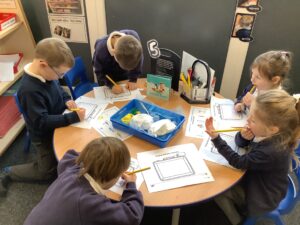
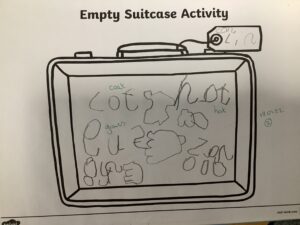
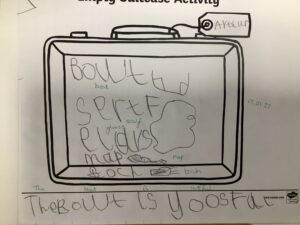
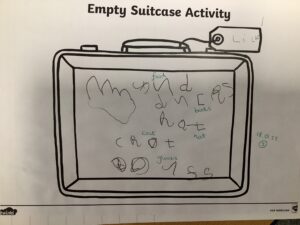
On Tuesday, we closed our eyes and imagined what we would do if a penguin was standing at our door. The children shared their ideas using the stem sentence: If I found a penguin, I would…
SF – take it to the park and put it on the swings and slides.
OR – give it breakfast, lunch, and dinner and then put it to bed under my bed.
PB – take it shopping for some pretty dresses.
RF – play lots of games with it.
Some of the children had a go at writing their idea. Check out their amazing writing!
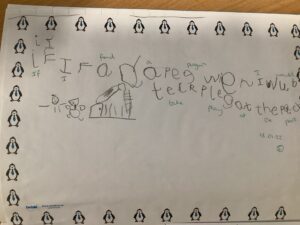
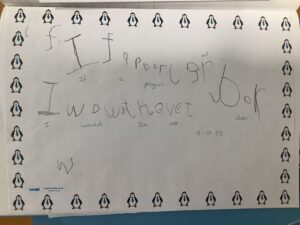
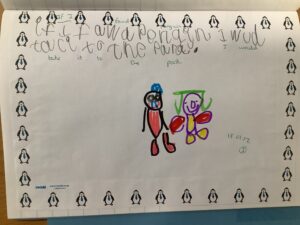
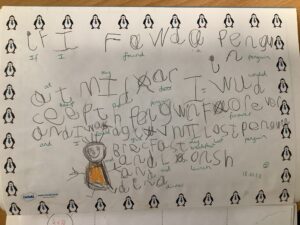
In Phonics, we recapped all of the phase 2 sounds. The children are really starting to show off their amazing phonics skills when doing their independent learning in the areas of provision. Thank you to those that have managed to get online and read your child’s eBook with them. A new book is issued each Friday.
Little Wandle has some great resources for parents, including videos and information sheets. Click here to find out more about supporting reading at home.
Reception had a fantastic PE lesson this week! We practised bouncing, throwing, and catching a ball. The children initially practised bouncing and catching the ball standing still. When they felt confident with that, we tried bouncing and catching the ball on the move. After that, we practised throwing and catching skills. A lot of children found this very tricky, but they didn’t give up!
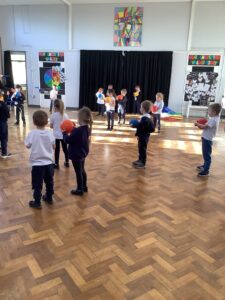
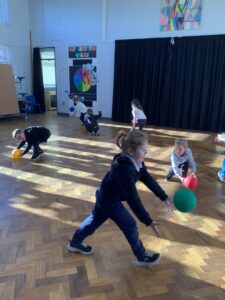
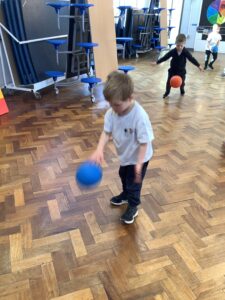
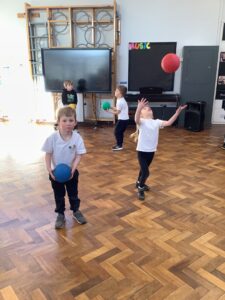
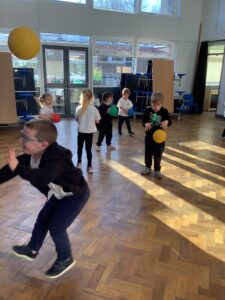
And more…
Take a look at some more amazing learning from this week:
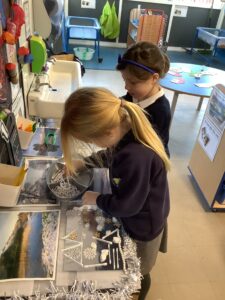
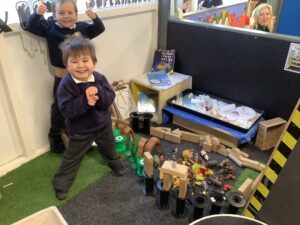
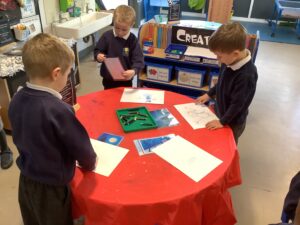
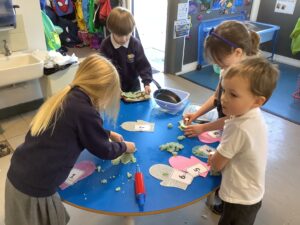
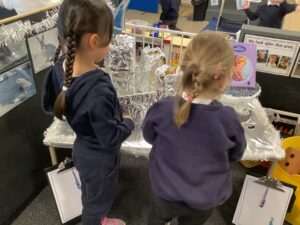
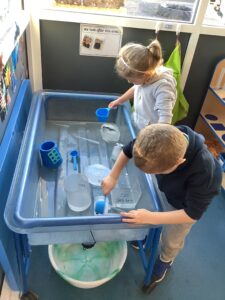
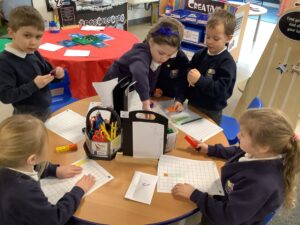
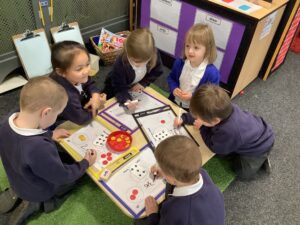
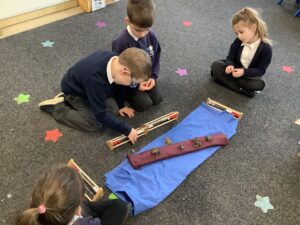
Diary Dates…
Tuesday 15 & Thursday 17 February – Parent-Teacher meetings
Monday 28 February – School closed: training day
Thursday 03 March – World Book Day
Home-Link Challenge
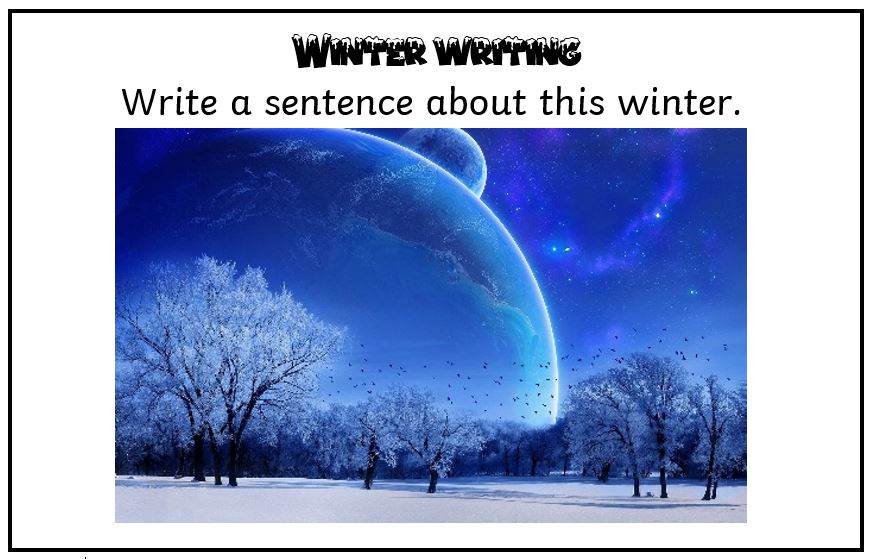
This week’s message (Friday 21 January 2022)
This week’s message kicks off with a repeat of one we sent on Wednesday, in case you missed it.
With the government’s announcement about the ending of Plan B restrictions next Thursday, it might seem that things are getting back to normal, and it might seem like most people with Covid have a relatively mild illness compared to previous strains.
In our schools, we’re struggling.
We’ve far more cases across all three schools (and across Leeds, from what we hear) than ever before amongst our children and our staff.
For pupils, when the number of positive cases of Covid rises, we have to consider isolating the class (‘bubbling’), and even move to home learning.
For staff, we’re committed to keeping the classes open. This is starting to prove really difficult – the more staff we have absent, the harder it is to cover. (And it’s really difficult to find supply teachers right now.)
Either way, this means learning is disrupted.
You can help us:
- Please continue to test your child often.
- Please continue to keep your child away from school if they’re not well, and make sure you test them.
- Please make sure you’re up-to-date with guidance, including self-isolation periods.
- Please be patient – we’re working really hard right now to manage the disruptions as best we can.
If your child’s at home…
- Please use the home learning materials we publish each week on our website – go to the Learn More section, choose Home Learning, and then click on your child’s year group.
- If you’re entitled to free school meals, please let us know – we can arrange for some food to be prepared.
The things I wish my parents had known…
This might seem like something more useful for older children, but the advice here could really help avoid issues later on…
The Children’s Commissioner, Dame Rachel de Souza DBE, has recently published a guidance document for parents helping to support them to understand online sexual harassment. It’s a sensitive topic, and not one all parents feel comfortable discussing with their children.
The commissioner’s team brought together a group of 16 – 21 year olds and asked them to talk about what they think parents should know, and what they should say to their children when talking about sexualised bullying and the pressures of growing up online.
Key advice from the young adults in the focus groups included:
- Start conversations early, before your child gets a phone or social media account. Keep the conversation going over time, adapting to your child.
- Young people want their parents to learn about new technology and trends, including risky behaviours and dangerous spaces online.
- Create a safe and trusting home environment. Young people told us the home environment is key, they want to share things with their parents but don’t always feel able.
Needing help?
We all need a bit of help from time to time…
The Family Lives charity aims to offer all parents somewhere to turn before they reach crisis point. Crisis support, provided for over 40 years through their helpline, has always been at the heart of what they do. The parents’ helpline is available Monday to Friday, 1.30 – 9pm: 0808 800 2222
Their website also offers help parents with the ups and downs of family life.
…And now it’s the weekend! Have a happy and healthy one, whatever you get up to.